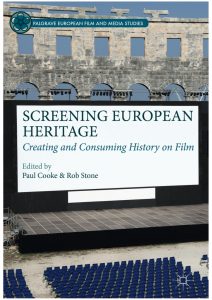Regular readers of this blog (hello? echo!) will recall that prior to embarking upon The Routledge Companion to World Cinema Paul Cooke and I set about Screening European Heritage too. This was one of the main outputs of the AHRC funded project that we ran on which Paul was PI (private investigator), I was CI (central intelligence) and Axel Bangert was RA (really amazing). There was a symposium and a conference too, a report to the House of Lords, a series of video essays and a 35 minute documentary entitled Basque Heritage Cinema; but the good old edited book, doyen of traditional academia, is almost out and it’s a chance to compare the two projects.
Here’s the cover, which shows none of the blood, sweat, tears and coffee cup stains within.

Looks harmless, doesn’t it? Well, the secret of editing is that the editors should bear the scars, not the book itself, and this one turned out just fine.
The idea was that this book would provide a unique examination of the way Europe’s past is represented on contemporary screens and what this says about contemporary cultural attitudes to history. How do historical dramas come to TV and cinema screens across Europe? How is this shaped by the policies and practices of cultural institutions, from media funding boards to tourist agencies and heritage sites? Who watches these productions and how are they consumed in cinemas, on TV and online? These are just some of the questions this volume seeks to answer. From The Lives of Others (in Paul’s chapter) to Game of Thrones (in mine), historical dramas are a particularly visible part of mainstream European film production, often generating major national debates on the role of the past in contemporary national identity construction.
We brought in some brilliant scholars to help us answer those questions and more. Here is the list of contents and contributors.
Introduction: Screening European Heritage by Axel Bangert, Paul Cooke & Rob Stone
Section One: Contexts of Production
The Politics and Sociology of Screening the Past: A National and Transnational Perspective … Ib Bondebjerg
British Flanders: Co-Produced Television Drama and the Limits of a European Heritage … Jaap Verheul
Towards World Heritage Cinema (Starting from the Negative) … Alan O’Leary
Section Two: Limits of Representation
Rewriting History from the Margins: Diasporic Memory, Shabby Chic and Archival Footage … Daniela Bergahn
Facing Dark Heritage: The Legacy of Nazi Perpetrators in 1970s German-language Film … Axel Bangert
Spectral Spanish Heritage: The Hauntology of La noche de los girasoles … Paul Mitchell
Adapting Balzac in Jacques Rivette’s Ne Touchez pas la hache (Don’t Touch the Axe, 2007): Violence and the Post-Heritage Aesthetic … Andrew Watts
The Ironic Gaze: Roots Tourism and Irish Heritage Cinema … Ruth Barton
Whose Heritage?: Noi credevamo and the National, Regional and Transnational Dynamics of the Risorgimento Film … Alex Marlow-Mann
Section Three: Modes of Consumption
Historical Films in Europe: The Transnational Production, Circulation and Reception of ‘National’ Heritage Drama … Andrew Higson
From ‘English’ Heritage to Transnational Audiences: Fan Perspectives and Practices and Why They Matter … Claire Monk
From ‘Auschwitz-land’ to Banglatown: Heritage Conflicts, Film and the Politics of Place … Paul Cooke
Cinematic Pilgrimages: Postmodern Heritage Cinema … Rob Stone
There, that’s it. Three years worth of hard work in 300 pages. In the immortal words of Barry Manilow:
We dreamers have our ways
Of facing rainy days
And somehow we survive
We keep the feelings warm
Protect them from the storm
Until our time arrives
Then one day the sun appears
And we come shining through those lonely years
We made it through the rain
We kept our world protected
We made it through the rain
We kept our point of view
We made it through the rain
Who knew that song was actually about editing a book?
